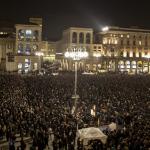Big Winner in Italian Election? The Five Star Movement

Italy's two major political parties are stunned by the results of this week's elections: the dramatic surge of the anti-establishment Movimento Cinque Stelle (The Five Star Movement).
The actual outcome of the Italian election remains in doubt, but there's no question who the big winner was: comedian-turned-political activist Beppe Grillo and the Five Star Movement (M5S).
Last year, the Five Star Movement barely registered in polls of likely Italian voters. With results now in, the Five Star Movement, took over 25% of the vote - more than the two major parties.
The Five Star Movement's anti-austerity, anti-establishment message struck a chord with millions of Italians. The 'Five Stars' of the movement are the party's core principles:
1.Publicly owned water
2.Sustainable transportation
3.Sustainable development
4.Free and open internet access
5.Environmentalism
The big loser? Austerity. Reuters reports:
The election, a massive rejection of the austerity policies applied by Prime Minister Mario Monti with the backing of international leaders from U.S. President Barack Obama to German Chancellor Angela Merkel, caused consternation across Europe.
Grillo's insurgent campaign had almost no money, just a couple of campaign staffers and an RV that carried Grillo all across Italy in what he dubbed the "Tsunami Tour."
The Five Star Movement's simple - yet clear and compelling - message paired with the smart use of social media overcame the challenges of a low-budget campaign. The M5S website is here - Facebook page here - Twitter here. Beppe Grillo's Blog (in English) here.
Jamie Bartlett writing for the Guardian:
How Beppe Grillo's Social Media Politics Took Italy by Storm
"The mainstream parties are finished! They won't survive for long", announced Beppe Grillo, in typical style, on his Five Star Movement's online television channel late on Monday night. For a long time political scientists have predicted that the internet would lead to the decline of formal political parties – and Beppe Grillo is showing how.
he has around a quarter of a million supporters who consider themselves members of the movement: an army of volunteers and door-knockers that would previously have taken years to recruit. The medium and the message fit hand in glove: the media is a racket, so circumvent it. Politics is closed – especially the party list system – so elect members online.
That is why his election rallies have been by far the most well attended of all the candidates, and why the pollsters didn't see him coming: his voters turned out more consistently than anyone else. The same thing happened in Germany with the Pirate party in the recent Berlin election, where pollsters dramatically underestimated their support. Polling companies have some work to do.
This election was a litmus test on whether social media campaigning and support can translate into actual votes. The result is a resounding yes. The melange of virtual and real-world political activity is the way millions of people relate to politics in the 21st century. Formal membership of political parties is plummeting, while social media following – Facebook groups or Twitter followers – is growing fast. Grillo has shown how to use them.
